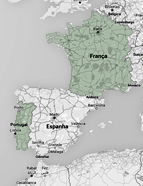

In a letter sent to Magalhães Godinho in March 1946, Fernand Braudel suggested the creation of a Centre d'Études et de Documentation Portugaises to make up for the lack of knowledge in France regarding Portuguese history (Magalhães Godinho, Do ofício e da cidadania..., pp. 115-116). It is therefore not surprising that the letter of principles sent by Magalhães Godinho from Paris to the founding members of the SPHC in February 1947, already set forth the objectives of sending all the historical information on the Portuguese reality that was requested of them, the identification of errors relating to the history of Portugal in French works and a report on the research and teaching of the human sciences in Portugal.
In turn, the SPHC also aimed to establish relations with foreign researchers, specifically from Brazil. In April 1948, Borges de Macedo reported that the SPHC's organising committee had already requested the collaboration of Brazilian researchers or researchers working in Brazil, such as Pedro Calmon, Gilberto Freire, Simões de Paula, Olga Pantaleão and Donald Pierson. Beyond France, relations with Brazilian researchers were a clear priority. In the statutes sent to the Civil Government, it was stated that SPHC centres could be set up in any Portuguese or Brazilian territory (Art. 2) and that ordinary members would be solely of these nationalities (Art. 7). This focus on relations with Brazil appears to suggest that in the expansionist intention of the Annales-related institutions - not least for the attention paid to the themes of overseas expansion and the blossoming of commercial capitalism on a global scale - Portugal would act as a platform for connection with the South American country.
Nevertheless, it should be noted that academic relations between Brazil and France had already been strengthened in the 1930s with the creation of the University of São Paulo. In its initial phase it established a partnership with a French mission that included Fernand Braudel, who taught there between 1935 and 1937. Almost two decades later, in 1954, another French mission went to São Paulo, this time including Magalhães Godinho (Ferlini, "Affluences, croisements..., 2005), which bears witness to the important academic relations and historiographical affinities between these countries' researchers - indeed, the academic trajectory of Joaquim Barradas de Carvalho is perhaps the best example of these connections (Mota, “Joaquim Barradas de Carvalho, 1994).
